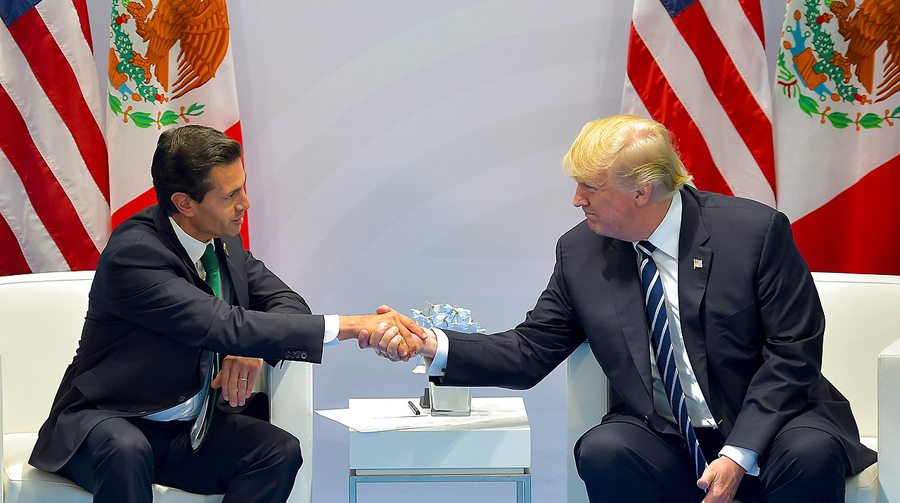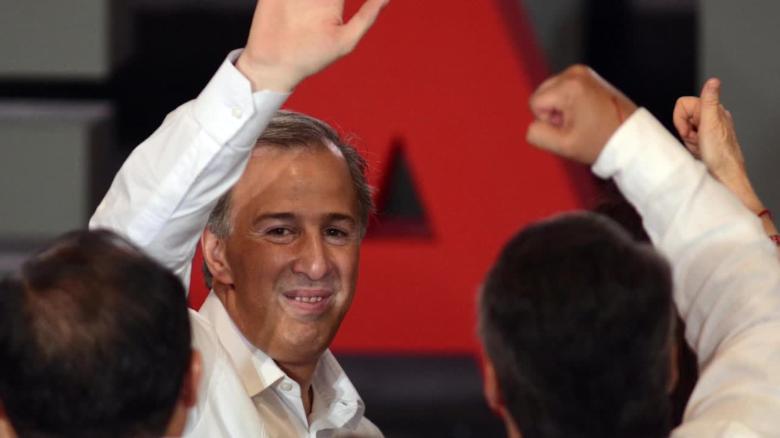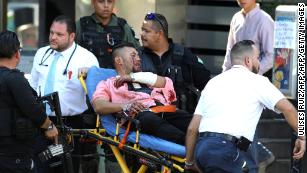Mexico’s Upcoming Presidential Elections

Mexico’s Upcoming Presidential Elections
Ray Sanchez of CNN reports on what is a stake in the Mexican Presidential elections for the country and the United States. –
“Mexican presidential front-runner Andres Manuel Lopez Obrador heads into Sunday’s watershed election with a substantial lead in the polls and the hopes of a country disenchanted with rampant corruption and escalating violence on his shoulders.
In addition to deciding on the third presidential bid of the former mayor of Mexico City, an electorate that has become increasingly angry with the political status quo will also select 500 members of Congress and 128 senators.
“I hesitate to say that all of Lopez Obrador’s support comes from simply an outrage vote,” said Michael Lettieri, a Mexico scholar and research fellow at the Washington DC-based Council on Hemispheric Affairs think tank.
“Certainly it’s an outrage vote and maybe this is concentrated in more urban intellectuals, but there’s also a hope vote. There’s a vote for Lopez Obrador that’s because there’s optimism that there can be change.”
Here’s what you need to know about the largest election in Mexico’s history, with more than 3,000 posts at stake:
close dialog
Who are the other leading presidential candidates?
The left-leaning Lopez Obrador’s nearest rival is Ricardo Anaya, candidate of the conservative National Action Party (PAN), which governed Mexico for 12 years before President Enrique Pena Nieto took office December 1, 2012. He has come in second in recent polls.
Anaya is followed by Jose Antonio Meade of the ruling Institutional Revolutionary Party (PRI), which appears on the brink of defeat after long dominating the country’s political landscape.
What’s the backdrop of the election?
Pena Nieto, who cannot run for re-election, has been criticized by many Mexicans for what they say was his failure to deal with widespread crime, corruption and inequality.
The election is turning into a referendum on the country’s political elite and economic direction — the leading candidate questioning the underlying policies of post-cold war Mexico, according to Shannon O’Neil, a Latin American studies fellow at the Council on Foreign Relations.
Pena Nieto’s Institutional Revolutionary Party’s 70-year grip on power was finally broken in 2000 with the election of Vicente Fox of the National Action Party.
But the promise of change under new administrations never materialized.
And Pena Nieto’s six years in office were tainted by successive political scandals, sluggish economic growth and his failure to implement political and economic reforms.
“I would describe his tenure as Pena-stroika lost,” Mexican political analyst Denise Dresser told CNN en Español, referring to the “perestroika” policy of economic and political reform instituted in the former Soviet Union in the mid-1980s.
Additionally, 132 candidates or politicians have been killed since the launch of Mexico’s electoral campaign in September, according to the consulting group Etellekt.
Candidates have been killed in 22 of Mexico’s 32 states during the campaign season. In Guerrero state alone, 23 were killed, according to Etellekt.
Mexico had more than 25,000 homicides last year, the highest number since the government started tracking the data two decades ago.
May 2018 was the deadliest month recorded since the government began releasing such data.
There have been a total of 20,506 homicides this year, with 4,381 homicides last month alone, according to the government’s most recent report.
“Pena Nieto himself, his administration has been a failure,” Lettieri said. “What most Mexicans have seen are the corruption scandals … and the violence — which, in a way, has become even more destabilizing under Pena Nieto. Organized crime has moved away from sort of organized, large-scale drug trafficking and toward much more predatory local activity.”
What is Lopez Obrador’s appeal?
The populist 64-year-old politician is known as AMLO in Mexico, where he came up as a member of the PRI before joining the left-leaning Party of the Democratic Revolution.
He has vowed to topple a political establishment he likens to a “mafia of power.” He has promised to divert the money that greases the wheels of political graft to boost social programs. But his opponents say he will plunge the country into greater debt and economic turmoil.
“In the main, it’s an anti-PRI vote and, by extension, the PAN — which has certainly been fairly close to the PRI in terms of governing these past six years,” Lettieri said.
Though Lopez Obrador’s pledges to clean up government and reduce violence have not been backed up with concrete proposals, analysts point out that the same can be said of the lackluster campaigns of his opponents.
“I don’t really want to pick on Lopez Obrador here because none of his opponents really did either,” Lettieri said of the candidates’ economic and social proposals.
“His anti-corruption approach has generally been panned by people in the anti-corruption community who prefer sort of very technical institutional solutions and Lopez Obrador’s philosophy can kind of be distilled down to, ‘I will not be corrupt. I will be against corruption.’ His idea is that what has been lacking is the institutional will.”
On the economy, O’Neil said via email, Lopez Obrador sees the state as the “impetus and savior, driving growth directly through investments, subsidies, and supports.”
Will the election affect Mexicio’s relationship with its neighbor to the north?
The two countries share billions of dollars in trade and a border that stretches for nearly 2,000 miles — across which President Donald Trump has vowed to erect a wall.
Millions of US citizens travel to Mexico every year, and millions of Mexican immigrants — undocumented and legal — live in the United States.
Last spring, Pena Nieto responded to Trump’s aggressive rhetoric against immigration from Mexico with a stern response, saying in a speech that “nothing and no one stands above the dignity of Mexico.”
That same day in April, Trump detailed plans to deploy 2,000 to 4,000 National Guard troops to the southern border until the completion of his long-promised wall. Days before, the President threatened on Twitter to pull the US out of the North American Free Trade Agreement, which Trump has called Mexico’s “cash cow.”
While Washington’s relationship with Mexico remains chilly, Lettieri said Lopez Obrador has vowed to work with the US. The front-runner has not been virulently anti-Trump duing a campaign that has largely focused on the immediate problems plaguing Mexico.
“Polls suggest that voters think he’s the one who will best stand up to Trump, but at the same time that’s not why he has a 20-point lead,” Lettieri said.
What is the most important voting bloc?
Roughly 89 million voters will be eligible to vote for the head of government in Mexico City as well as governorships in the states of Chiapas, Guanajuato, Jalisco, Morelos, Puebla, Tabasco, Veracruz and the Yucatán. There are also local seats at stake in 30 states, according to electoral officials
Nearly 13 million young people between the ages of 18 and 23 are expected to vote for the first time, electoral authorities said.
“Given that a majority of Mexico’s citizens are relatively young, the most important bloc in this watershed election year is composed of people between the ages of 18 and 35,” according to apaper published in March by Rice University’s Baker Institute for Public Policy.
“In Mexico, these two groups together constitute around 45 percent of eligible voters.”
On Sunday, Mexico’s millennials and so-called Generation Z could play a huge role in defining the next generation of the nation’s leaders.”



















